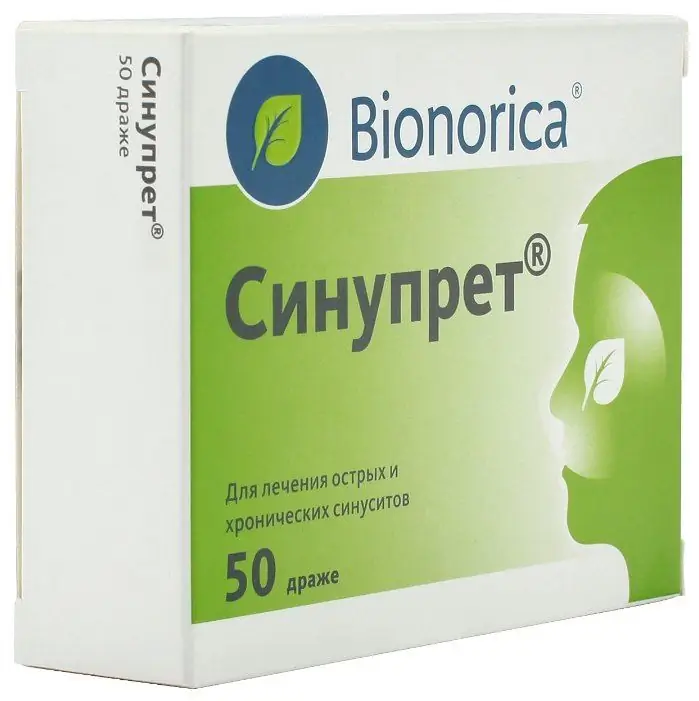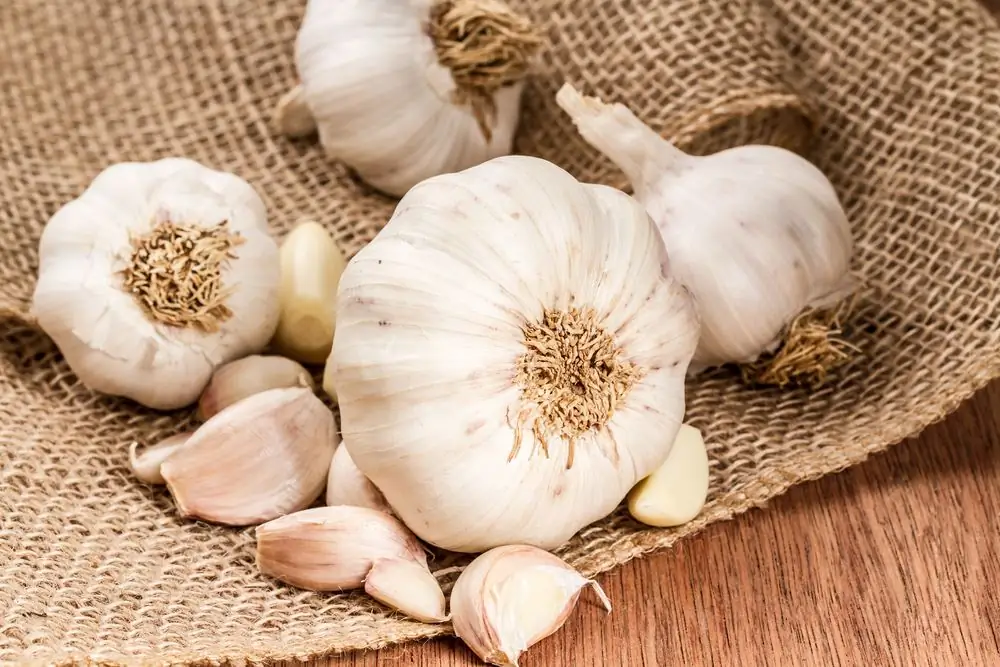2026 Author: Priscilla Miln | miln@babymagazinclub.com. Last modified: 2025-06-01 05:14:29
Garlic has long been a well-known herbal antiseptic. It is usually taken to prevent infectious diseases. And thanks to its unique taste properties, it is also used as a spicy note for hot dishes. But can you eat garlic during pregnancy? Here you need to thoroughly understand the benefits and harms of this product.
Composition and characteristics
Garlic is a perennial plant with a pungent taste and characteristic odor. It is eaten both raw and cooked. But most often it is used as a seasoning for the main dish.
Garlic owes its flavor to the allicin (essential oil) it contains. Allicin is an organic compound that has powerful antioxidant properties. Its amount in the composition of the plant ranges from 0.23 to 0.74% per 100 grams.
In addition to allicin, garlic contains (per 100 g):
- Macronutrients (Calcium 180mg, Potassium 400mg, Sodium 17mg).
- Micronutrients (Magnesium 26mg, Zinc 1.2mg, Selenium 14mg, Manganese 1.7mg, Iron 1.7mg).
- Vitamins (B1-B3, B5, B 6, B9, S).

Despite the fact that garlic is rarely consumed in its pure form, there is data on its nutritional value:
- Calorie - 149 Kcal/623 kJ.
- Proteins - 6.4g
- Fat - 0.5g
- Carbohydrates - 33.1g
Garlic also contains sugar (about 1 g per 100 g) and water in the amount of 58 g. In addition, other components should be mentioned, such as caffeic and pyruvic acid. Garlic, thanks to the vitamin and mineral cocktail, is one of the most useful vegetable crops. And its essential oil is among the best antioxidant plant substances.
The use of garlic in medicine
Garlic during pregnancy is often used for medicinal purposes. As an element in the complex therapy of certain diseases, it is really indispensable. After all, it has the following effect on the body:
- anti-inflammatory;
- fungicidal;
- antimalarial;
- antiviral;
- antiparasitic.
During the period of viral diseases, garlic is used as a prophylaxis against SARS and influenza, as it protects the body from the penetration of bacteria and strengthens the immune system. It will also be useful in the fight against bacteria and parasites. It has been proven that garlic actively affects E. coli,staphylococcus aureus, salmonella and fungi of the genus Candida.

However, a definite affirmative answer to the question of whether garlic can be given during pregnancy cannot be given. This is because the use of this product is only safe if there are no contraindications.
Benefits of garlic during pregnancy
Pregnant women are advised to avoid the use of excessive amounts of synthetic medications. Therefore, doctors always try to find a more gentle treatment for them, including with the help of garlic or preparations based on its essential oil. Recommendations for the use of this vegetable crop are formed on the basis of the benefits that it can bring to a woman's body. Benefits of garlic include:
- Prevention and treatment of toxicosis.
- Neutralization of putrefactive and pathogenic bacteria in case of food poisoning.
- Improve appetite and accelerate metabolic processes in the body.
- Prevention of thrombosis through blood thinning.
- Reduce blood sugar.
- Prevention and treatment of viral diseases.
- Strengthening immunity during the season of SARS and flu outbreaks.
- Lower blood pressure.
- Treatment of helminthiases.

Despite all the benefits of garlic during pregnancy, do not be too zealous with its use. After all, in addition to a positive effect, it also has the opposite effect on the body.
Harm of garlic
Harm from garlic can betest only if an excess of its essential oil enters the body. And it does not matter how it will happen: directly from food or from preparations based on it.
The harmful properties of garlic during pregnancy include:
- Risk of provoking uterine contractions. Therefore, you should be especially careful when taking garlic during early and late pregnancy.
- Allergic reactions. Only those women who, even before pregnancy, observed the side effects of garlic are prone to allergies. However, there is an opinion that its excessive use can provoke an allergy in a child to this product.
- Heartburn or stomach pain. Garlic has a pungent taste, which can cause stomach problems.
- Blood thinning. Garlic during pregnancy can only be consumed by women who do not have such a disease as thrombocytopenia. Otherwise, it will only provoke additional complications for both mother and child.

Contraindications
If we consider garlic not as a seasoning, but as a medicinal preparation, it is necessary to identify a number of pathologies and diseases in which the use of this product is contraindicated. These include:
- allergy;
- gastritis;
- gastric ulcer;
- liver and kidney disease;
- gastrointestinal problems;
- disturbances in the work of the central nervous system and the cardiovascular system;
- signs of toxicosis associated with the smell of garlic.
Garlic during early pregnancy
Despite the fact that one of the harmful properties of garlic is the stimulation of uterine contractions, it is extremely rare. This phenomenon was mainly observed in he althy patients who ate this product in excess. Therefore, speaking about whether garlic is possible in early pregnancy, you need to know the rate, which is 1-2 cloves per day.
Those women who in the first trimester experience pulling pains in the abdomen or have spotting should stop using this product. Diseases of the liver and kidneys may also be a contraindication.

To be absolutely sure whether garlic is possible during early pregnancy, you need to seek an individual consultation with a gynecologist. He, based on the patient's medical data and test results, can weigh the risks that a woman is exposed to during the period of gestation.
Second and third trimesters of pregnancy
The ban on the use of garlic at these stages of pregnancy may be associated with a reduced number of red blood cells. This is very common among women, so you need to regularly take a blood test and, if necessary, take drugs that thicken it.

At 7-9 months of pregnancy, when the baby begins to take up more and more space, many pregnant women complain of heartburn attacks. Unfortunately, garlic is one of the factors that can provoke it. And if in the second trimester doctors do notfind reasons to forbid a he althy woman to use garlic as a prophylaxis, then in the third they advise against it after all, so as not to provoke premature birth.
Garlic: methods of application and doses
The norm for pregnant women is 1-3 cloves of fresh garlic per day. Most often they rub croutons, but there are other ways to use it. For example, garlic oil. It contains garlic, fresh lemon and butter. To make garlic oil, grind lemon and garlic in a blender. Then the resulting mixture is mixed with butter (100-150 g), which must first be heated to room temperature. The resulting mixture is formed into a bar and left to harden in the refrigerator.

In folk medicine, a milk-garlic drink is recommended to be used to combat parasites. To prepare such a mixture, you need to add 10-15 drops of garlic juice to 1 glass of milk. Due to the specific taste, the drink should be consumed in small portions throughout the day.
Garlic-honey mixture is used to prevent colds. For its preparation, garlic is mixed with honey in a 1: 1 ratio. The resulting mixture can be stored in the refrigerator, use 1 teaspoon per day.
Pregnant women should not arbitrarily get involved in traditional medicine. All actions must be coordinated with a doctor who will give detailed recommendations on the use of a particular product.
Recommended:
"Cycloferon" during pregnancy - is it possible or not? Instructions for use of the drug during pregnancy

The use of "Cycloferon" during pregnancy in the early stages helps to get rid of the symptoms of viral and infectious disorders. Human immunity is activated, a stable antimicrobial effect occurs. Tumor formation in the body slows down, autoimmune reactions are restrained, pain symptoms go away
"Sinupret" during pregnancy in the 3rd trimester. Instructions for use of the drug during pregnancy

Infection and inflammation are more pronounced when the body is weakened, so experts choose safe medicines. Used "Sinupret" during pregnancy. The 3rd trimester passes without serious complications if the infection can be overcome on time with the help of this medicine
Can dogs have garlic: the benefits and harms of garlic for a pet

Some dog owners give their pets garlic to get rid of worms. How correct is this? Let's consider whether it is possible to give garlic to dogs. Can this negatively affect the he alth of the pet? What do doctors think about this?
From what age can garlic be given to a child: age for complementary foods, the beneficial properties of garlic, the pros and cons of adding it to a baby's diet

Let's deal with the main question, namely: at what age can you give garlic to a child? There is an opinion that it is better not to do this until six years old, even boiled. But pediatricians themselves say that one should not be afraid of everything in this regard. However, there are a number of caveats
At what age can children be given garlic? The he alth benefits and harms of garlic

Garlic has many he alth benefits and helps fight infections and diseases. However, it is not recommended to give it to children from the first days of life. Consider when you can introduce this product into the diet of your beloved baby

